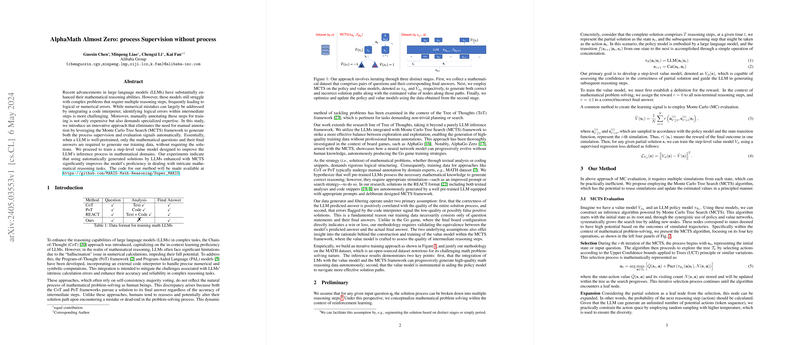Enhanced Mathematical Reasoning in AI through MCTS Integration
Introduction to Monte Carlo Tree Search (MCTS) and LLMs
Understanding and improving the reasoning capabilities of LLMs in complex domains like mathematics has been a notable area of research. Recent advancements have tried to push LLMs to handle intricate mathematical problems better. The application of strategies such as Chain-of-Thought (CoT) and Program-of-Thought (PoT) frameworks has made strides but still falls short, particularly when dealing with the inherent numerical hallucination that LLMs exhibit.
This has brought forth innovative research leveraging the Monte Carlo Tree Search (MCTS), a well-known tactic from the field of AI in games, to bridge the gap in stepwise logical reasoning within LLMs. The primary emphasis is on generating solution processes autonomously that guide the LLM through the maze of potential solution pathways efficiently, enhancing both the generation of correct outcomes and understanding the step-level validity of those solutions.
Key Elements of the Research
- MCTS Integration: The research proposes integrating MCTS with a pre-trained LLM to automatically generate both the training data and the evaluation signals for mathematical reasoning. This eliminates the need for labor-intensive manual annotation.
- Step-Level Value Model: By focusing on a step-level value model, the system can assess the viability of each reasoning step iteratively, providing guidance to the LLM on how to proceed effectively at each juncture of problem-solving.
- Autonomous Data Generation: The approach stands out by generating high-quality data independently, relying solely on the model’s internal capabilities without any manual intervention, thereby reducing the associated costs and reliance on extensive labeled datasets.
Implications and Speculations on Future Developments
The ability to enhance an LLM’s reasoning through MCTS opens up several intriguing pathways:
- Reduced Dependency on Annotated Data: With the ability to self-generate training data, the reliance on manually annotated mathematical solutions can decrease significantly, aligning AI training processes more with cost-effective strategies.
- Enhanced Analytical Capabilities: As LLMs improve in navigating through complex reasoning pathways with accurate step-level assessments, their applications could extend beyond academia, assisting in fields requiring stringent logical analysis such as software development, data analysis, and even educational tools.
- Quality of AI Reasoning: The continued evolution of integrating techniques like MCTS suggests a future where AI might be able to reason out issues comparable to or perhaps surpassing human expertise in certain domains.
Major Findings and Results
The experiments conducted using the MARIO MATH Reasoning framework on datasets like GSM8K and MATH reveal significant improvements:
- Enhanced problem-solving capabilities, with numerical results showing noteworthy jumps of up to 20 points in accuracy on challenging problem sets.
- The ability to autonomously generate step-by-step reasoning paths that not only reach the correct solution more frequently but also demonstrate the internal logic the model uses to get there.
Concluding Thoughts
The integration of Monte Carlo Tree Search with LLMs marks a significant step forward in addressing some of the inherent limitations of current AI models in handling complex, multi-step reasoning tasks like mathematical problem-solving. This method’s success offers a promising insight into future advancements where AI can autonomously learn and improve without heavy human intervention. The shifts made here also suggest potential extensions into other domains of knowledge outside mathematics, possibly providing a new standard in AI-driven research and applications.
